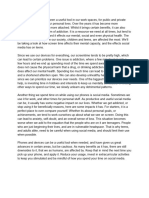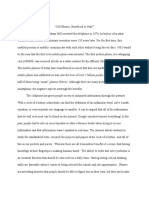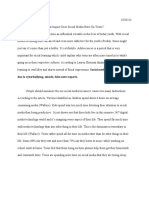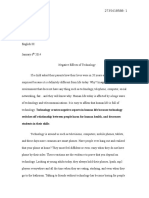0% found this document useful (0 votes)
51 views2 pagesIs Technology Making Us Less Social
The document discusses how technology, particularly smartphones and social media, is making people less social by reducing face-to-face interactions and fostering superficial relationships. It highlights various negative impacts, including health issues, family problems, cyberbullying, and decreased communication skills. The overall effect is a rise in loneliness, addiction to technology, and a decline in meaningful emotional connections.
Uploaded by
sahiti1309Copyright
© © All Rights Reserved
We take content rights seriously. If you suspect this is your content, claim it here.
Available Formats
Download as DOCX, PDF, TXT or read online on Scribd
0% found this document useful (0 votes)
51 views2 pagesIs Technology Making Us Less Social
The document discusses how technology, particularly smartphones and social media, is making people less social by reducing face-to-face interactions and fostering superficial relationships. It highlights various negative impacts, including health issues, family problems, cyberbullying, and decreased communication skills. The overall effect is a rise in loneliness, addiction to technology, and a decline in meaningful emotional connections.
Uploaded by
sahiti1309Copyright
© © All Rights Reserved
We take content rights seriously. If you suspect this is your content, claim it here.
Available Formats
Download as DOCX, PDF, TXT or read online on Scribd
/ 2
































































